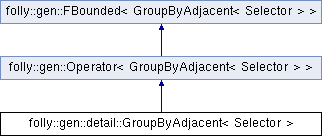folly::gen::detail::GroupByAdjacent< Selector > Class Template Reference
#include <Base-inl.h>
Inheritance diagram for folly::gen::detail::GroupByAdjacent< Selector >:

Classes | |
| class | Generator |
Public Member Functions | |
| GroupByAdjacent () | |
| GroupByAdjacent (Selector selector) | |
| template<class Source , class Value , class Gen = Generator<Value, Source>> | |
| Gen | compose (GenImpl< Value, Source > &&source) const |
| template<class Source , class Value , class Gen = Generator<Value, Source>> | |
| Gen | compose (const GenImpl< Value, Source > &source) const |
 Public Member Functions inherited from folly::gen::Operator< GroupByAdjacent< Selector > > Public Member Functions inherited from folly::gen::Operator< GroupByAdjacent< Selector > > | |
| ResultGen | compose (const GenImpl< Value, Source > &source) const |
 Public Member Functions inherited from folly::gen::FBounded< Self > Public Member Functions inherited from folly::gen::FBounded< Self > | |
| const Self & | self () const |
| Self & | self () |
Private Attributes | |
| Selector | selector_ |
Additional Inherited Members | |
 Protected Member Functions inherited from folly::gen::Operator< GroupByAdjacent< Selector > > Protected Member Functions inherited from folly::gen::Operator< GroupByAdjacent< Selector > > | |
| Operator ()=default | |
| Operator (Operator &&) noexcept=default | |
| Operator (const Operator &)=default | |
| Operator & | operator= (Operator &&) noexcept=default |
| Operator & | operator= (const Operator &)=default |
Detailed Description
template<class Selector>
class folly::gen::detail::GroupByAdjacent< Selector >
GroupByAdjacent - Group adjacent values by a given key selector, producing a sequence of groups. This differs from GroupBy in that only contiguous sets of values with the same key are considered part of the same group. Unlike GroupBy, this can be used on infinite sequences.
This type is usually used through the 'groupByAdjacent' helper function:
auto tens = seq(0) | groupByAdjacent([](int i){ return (i / 10) % 2; })
This example results in a list like [ 0:[0-9], 1:[10-19], 0:[20-29], ... ]
Definition at line 1221 of file Base-inl.h.
Constructor & Destructor Documentation
template<class Selector >
|
inline |
Definition at line 1225 of file Base-inl.h.
template<class Selector >
|
inlineexplicit |
Member Function Documentation
template<class Selector >
template<class Source , class Value , class Gen = Generator<Value, Source>>
|
inline |
template<class Selector >
template<class Source , class Value , class Gen = Generator<Value, Source>>
|
inline |
Member Data Documentation
template<class Selector >
|
private |
Definition at line 1222 of file Base-inl.h.
The documentation for this class was generated from the following file:
- proxygen/folly/folly/gen/Base-inl.h
